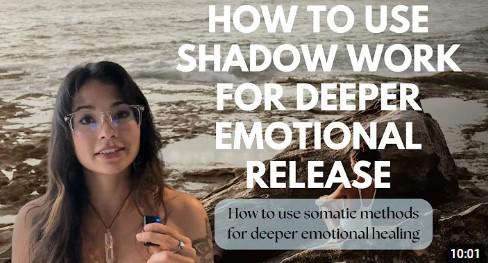
Today, I've been reflecting on my belief about holistic healing and its role in maintaining our health. Watching Kenia's video on shadow work and the mind-body connection brought a lot of my thoughts into clearer focus. I found myself agreeing with many of her ideas, especially the emphasis on self-awareness and the body's role in communicating deeper, often neglected inner truths. I realize how important this is not just for emotional health but for physical well-being as well. There's a profound relationship between what we carry in our minds and what manifests physically. I've felt that firsthand—the stress that builds in my chest or the anxiety that tightens my shoulders. It's like our bodies are always trying to send us messages about what's really going on beneath the surface, whether it's unresolved tension, old wounds, or fears we haven't properly addressed.
The mind-body connection is such an interesting and intricate web. The more I reflect on it, the clearer it becomes that our physical sensations and emotional experiences aren't isolated. Kenia’s focus on somatic practices—things like mindful movement and breathwork—offers practical ways to connect more deeply to what we’re experiencing emotionally through our physical selves. I found this particularly insightful because, while traditional medicine might focus on relieving the physical symptom, holistic practices like these help us explore what those symptoms are pointing to. It’s not just about feeling better in the moment, but about understanding the messages behind the physical discomfort.
This reflection also reminded me of my own meditative experiences, particularly those moments of sensation of dissolving boundaries between my body and my mind. I think back to some of my deeper meditative practices, where I've felt my sense of self slip away, replaced with a feeling of connection to everything around me. In those moments, it was like I could see the layers of my ego falling away—not in a dramatic or frightening sense, but in a gentle unraveling that revealed a deeper truth. It's similar to the way Kenia talks about shadow work: we peel back the layers of what we've hidden from ourselves and start to understand what is underneath. In my case, these moments in meditation were powerful because they allowed me to understand my fears and defenses in a more intimate way, without judgment or the pressure to immediately "fix" them.
For me, this practice of listening to the body is a crucial piece of overall health. I can see how cultivating an attentive, compassionate relationship with ourselves can lead to significant self growth—both mentally and physically. Kenia encourages people to not shy away from the discomfort of exploring the shadows, and in doing so, to break down barriers to deeper understanding. It resonates with me because it lines up with my belief that self-awareness is foundational to well-being. By listening to our bodies—being aware of how we hold our emotions physically—we can start to heal more deeply. It’s also an area I’ve always seemed to struggle with and that I aim to tackle now with my newfound self awareness.
Yet, I also remain steadfast in my view that holistic practices should complement medicine rather than replace it. I think the more we work toward understanding our bodies through somatic practices and shadow work, the more empowered we become to deal with things that traditional medicine can't address alone. But at the same time, I know that medicine plays an irreplaceable role. Such as a chronic condition like my epilepsy or something more immediate, the advancements and interventions of medical science are crucial. Holistic healing can offer tools, insight, and practices that enhance that experience—offering something that supports, rather than competes with, traditional treatment.
It's all about balance. I think a system that acknowledges the importance of holistic methods and integrates them thoughtfully with medical care offers the best outcomes—particularly for those of us managing chronic or complex health conditions. Holistic practices offer significant benefits when it comes to mental health, providing another layer of care that speaks to who we are beyond just our symptoms or diagnoses. They can’t replace the science behind medicine, but they can certainly add meaning and depth to our healing journey.
Ultimately, this has confirmed for me the value of being open to different approaches—traditional medicine for the practical, immediate needs and holistic practices for that deeper, more personal journey of growth. Both sides of care have a role to play, and perhaps the most powerful thing we can do for ourselves is remain open to what our bodies are telling us, while also accepting the help available from every resource we have.
Source:
“The Power of Shadow Work: Exploring the Mind-Body Connection” by Embodied with Kenia on YouTube.